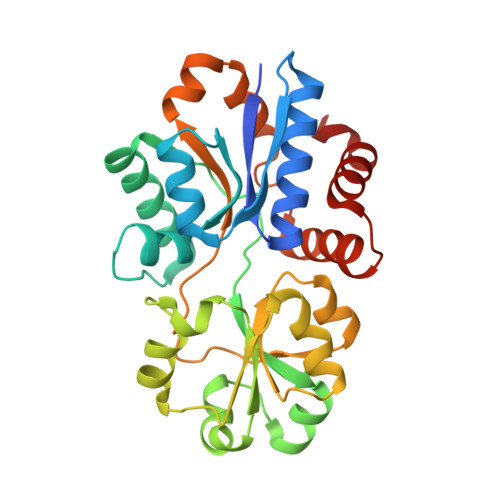The Crystal Structure of the Substrate-Binding Protein OpuBC from Bacillus subtilis in Complex with Choline.
Pittelkow, M., Tschapek, B., Smits, S.H., Schmitt, L., Bremer, E.(2011) J Mol Biol 411: 53-67
- PubMed: 21658392
- DOI: https://doi.org/10.1016/j.jmb.2011.05.037
- Primary Citation of Related Structures:
3R6U - PubMed Abstract:
Bacillus subtilis can synthesize the compatible solute glycine betaine as an osmoprotectant from an exogenous supply of the precursor choline. Import of choline is mediated by two osmotically inducible ABC transport systems: OpuB and OpuC. OpuC catalyzes the import of various osmoprotectants, whereas OpuB is highly specific for choline. OpuBC is the substrate-binding protein of the OpuB transporter, and we have analyzed the affinity of the OpuBC/choline complex by intrinsic tryptophan fluorescence and determined a K(d) value of about 30 ¦̀M. The X-ray crystal structure of the OpuBC/choline complex was solved at a resolution of 1.6 ? and revealed a fold typical of class II substrate-binding proteins. The positively charged trimethylammonium head group of choline is wedged into an aromatic cage formed by four tyrosine residues and is bound via cation-pi interactions. The hydroxyl group of choline protrudes out of this aromatic cage and makes a single interaction with residue Gln19. The substitution of this residue by Ala decreases choline binding affinity by approximately 15-fold. A water network stabilizes choline within its substrate-binding site and promotes indirect interactions between the two lobes of the OpuBC protein. Disruption of this intricate water network by site-directed mutagenesis of selected residues in OpuBC either strongly reduces choline binding affinity (between 18-fold and 25-fold) or abrogates ligand binding. The crystal structure of the OpuBC/choline complex provides a rational for the observed choline specificity of the OpuB ABC importer in vivo and explains its inability to catalyze the import of glycine betaine into osmotically stressed B. subtilis cells.
Organizational Affiliation:
Laboratory for Microbiology, Department of Biology, Philipps University Marburg, Marburg, Germany.















